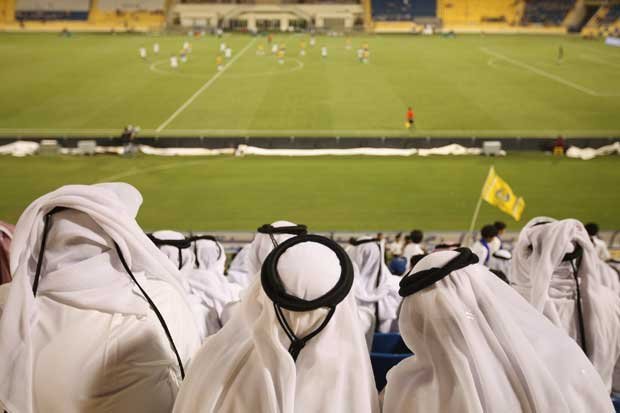
"Football, it seemed to me, is not really played for the pleasure of kicking a ball about, but is a species of fighting."
—George Orwell
It is quite a radical statement by the
well- known dystopian writer. To allude that the game of football
unearths a particular strand of human nature that has a propensity to
violence and fighting could be considered as sensational exaggeration by
the lovers of the sport. Such a statement is not the debate here.
However, what appears clear is that Orwell is certainly well ahead of
his time. Without doubt, he is one of the few thinkers able to
articulate the outlook of the trajectory of human existence as bleak and
pessimistic. One wonders if Orwell foresaw the current reality of
football as it stands today; excessive wages, lavish lifestyles of the
players as well as hooliganism, racism and the propensity to create
regional rivalry.
One dimension to the world's most
favourite sport, which has crept onto the radar in recent times, is the
powerful tendency towards exploitation. Qatar, the tiny Gulf state, has
been under the international spotlight in relation to the process of
'winning' the bid to host the World Cup in 2022. The country with a
small population of 2 million people wishes to portray itself as modern,
futuristic and technologically savvy, capable of creating an
extravaganza of one of the most important sporting events. No doubt, it
can do this but at what cost? Initial concerns were raised about the
dubious way in which Qatar was given such an opportunity, as many
analysts speculated that bribery and corruption at the highest levels
were pivotal in the decision. The French President, Nicholas Sarkozy,
was exposed by the respected magazine, France Football, for 'acts of
collusion and corruption' as he secretly held a lunch meeting with the
crown prince of Qatar, Tamin ibn Hamam al-Thani, Michel Platini,
president of the European Football Association and a representative of
the investment fund which owned the then struggling French football
club, Paris Saint-Germain. It is alleged that Mr Platini was pressured
by the Qatari's to reconsider his initial thoughts of the World Cup to
be held in the United States. The Qatari's would fulfill the 'deal' by
buying Paris Saint Germaine and establishing a new TV sports channel in
France to rival Canal Plus, a channel Sarkozy loathes. Therefore,
economics and politics are the two pronged influences that have shaped
the decision. Although, many of the reports are speculative in nature,
if one takes into consideration the various media contracts,
construction deals by international firms and other actors that have
vested interests in Qatar, then it becomes pryingly obvious that huge
sums of money is set to settle in the wallets of a small minority of
elites around the globe, whether in government, construction, media or
football.
However, what is likely to severely dent the credentials of the tournament is a recent investigation by The Guardian
that shed light on the abuses many of the construction workers are
victims of. The report documents evidence of migrants from South Asia
working an excess of 12 hour shifts in the baking heat with little
access to food and water. Some accounts speak of individuals begging for
food from fellow colleagues, as wages are suspended. To add further
discomfort to the story, construction employers would confiscate
passports and ID cards. Even the accommodations they reside in are
poorly ventilated, squalid and crammed with many others who find
themselves in the same predicament.
The $100 billion infrastructure project
is set to be the costliest world cup ever as a new rail system, an
entire new suburb adjoining its capital Doha, luxury hotels with
transport links and nine state-of-the-art, air-conditioned stadiums are
forecasted to be constructed. Such lavish spending stands in stark
contrast to the working conditions of its labour force, much of which is
imported from very poor countries and which make up about 90% of its
residents. Many of us would not be surprised by these findings as
similar stories leak out of the United Arab Emirates, Saudi Arabia and
Kuwait. It is true that one of the reasons for the economic prosperity
of the region is due to worker exploitation. Often the stories are
reminiscent of the squalid conditions slaves had to work in during the
European conquests of the Americas or the harsh conditions during the
industrial revolution of Britain. Historians would agree that slave
labour is closely interwoven with economic prospects and unfortunately
such a reality is all too common around the world.
As part of our analysis on such a
grotesque phenomenon, one has to scrutinize the ethical premise that
contributes to such a situation. The secular ethics espoused by the
elites has always created gross resentment and insecurity, as the
criteria of utilitarianism championed by Jeremy Bentham and further
enforced by John Stuart Mill has been the dominant yardstick of deciding
upon what actions to take. Bentham based his moral philosophy upon the
principle, 'Nature has placed mankind under the governance of two
sovereign masters, pain and pleasure'. Such a basis affirms two strands
of thought; one concerns the pursuit of seeking happiness or pleasure
for certain interest groups, even if a minority are subjugated and
second, a question is inevitably asked, and 'Does the end justify the
means?' If the net outcome of an action is considered 'good' or
'beneficial', can one overlook the means or methods that were employed
in order to achieve the results?
Above is just a cursory glance of the
underlying fundamental problem that we are witnessing in a world where
divine ethics are sidelined and replaced by humanist considerations. As
secularism coupled with Capitalist policies continually favour a very
small minority, it is imperative for the Muslims to go back to the
teachings of the Messenger صلى الله عليه وسلم so we can understand the
righteous way one undertakes social actions. The category of mu'amalaat
can be understood at its basic level by making recourse to a handful of
narrations:-
'Those are your brothers
[workers under you] who are around you, Allah has placed them under you.
So, if anyone of you has someone under him, he should feed him out of
what he himself eats, clothe him like what he himself puts on, and let
him not put so much burden on him that he is not able to bear, [and if
that be the case], then lend your help to him' (Bukhari)
The Prophet صلى الله عليه وسلم also said:
'I will be a foe to three
persons on the Last Day: one of them being the one who, when he employs a
person that has accomplished his duty, does not give him his due.' (Bukhari)
Furthermore, In the Sunan of Ibn Majah, the Messenger صلى الله عليه وسلم said, 'The wages of the labourers must be paid to him before the sweat dries upon his body.'
Therefore, one cannot help but feel
contempt for the government of Qatar. Despite its vast oil wealth, she
shows very little interest in playing a sincere role in the Muslim
World; instead those in the royal family are rushing to fulfill their
pockets and satisfy their egos by championing the opportunity in hosting
the World Cup. They should at least ponder and reflect upon the saying
of the Messenger and aim to implement the divine law upon the people,
only then will it to be admiration of the world for its just system.
Until then, I still wonder if George Orwell foresaw how soccer would be
the pretext to exploitation and slavery.
Tuesday, 08 October 2013 07:07 Saqib Bukhari
Tuesday, 08 October 2013 07:07 Saqib Bukhari






.jpg)






0 comments:
Post a Comment